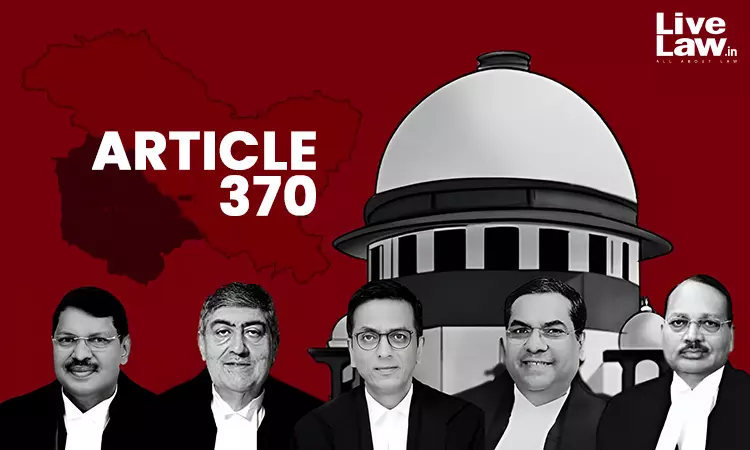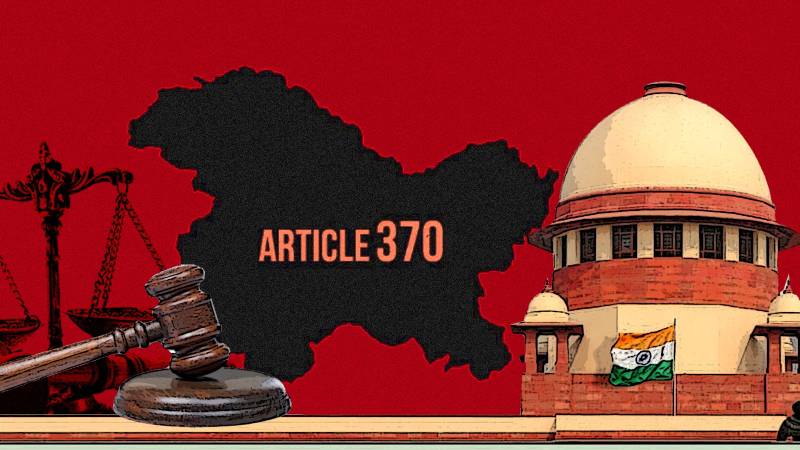Article 370 of the Constitution of India. which previously granted significant autonomy to the region of Jammu and Kashmir, was abrogated on August 5, 2019, by the Indian government. This monumental decision led to the reorganization of Jammu and Kashmir into two separate Union Territories: Jammu & Kashmir and Ladakh3. The move has been a focal point of political debate and legal scrutiny ever since.
Legal Development Post-Abrogation:
- The legal journey following the abrogation of Article 370 has been significant. On December 11, 2023, the Supreme Court of India upheld the constitutional validity of the abrogation, stating that Article 370 was temporary in nature. Chief Justice DY Chandrachud declared that it was an “interim arrangement” resulting from the conditions prevailing in the late 1940s when the region acceded to India46.
- This ruling has been seen as a boost for the ruling Bharatiya Janata Party (BJP), reinforcing its long-standing stance against the special status of Jammu and Kashmir6. The court’s decision has significant implications for the governance and political structure of the region moving forward.
Implications of the Abrogation:
- The revocation of Article 370 allowed for ordinary Indian laws to be applicable in Jammu and Kashmir, thereby asserting greater control of the central government over the region3. Following the abrogation, laws concerning property rights and job reservations were altered. Subsequently, Article 35A, which had facilitated unique rights and privileges for residents of Jammu and Kashmir, was also rescinded, paving the way for non-Kashmiris to buy property in the region46.
- Critics of the decision express concerns that these changes may modify the demographic composition of the predominantly Muslim region, potentially altering its cultural landscape34. Furthermore, many believe that this integration could lead to greater tension in the region, given its historically volatile landscape.
Political Reactions and Local Sentiments :
- The political reaction to the abrogation has been mixed. Numerous local political figures, including former Chief Ministers Omar Abdullah and Mehbooba Mufti, have voiced their dissent over the Supreme Court’s ruling, expressing disappointment but vowing to continue their struggle for the rights of Kashmiris6. The sentiment among certain factions remains that the abrogation represents an annexation rather than a genuine effort aimed at integrating Jammu and Kashmir into India6.
- Subsequently, the Bharatiya Janata Party and Prime Minister Narendra Modi have hailed the abrogation as a “watershed moment” in India’s history, claiming it has ushered in an era of development and integration in the region25. Modi asserts that the abrogation has countered corruption and improved governance, benefitting marginalized communities such as women and tribals25.
Human Rights Concerns :
- Following the abrogation, human rights concerns have come to the forefront. Reports of increased militarization and restrictions on freedoms have been reported, as security forces have been deployed in large numbers to maintain order1. The curtailment of communication during the initial days following the revocation raised alarms from human rights organizations, which highlighted the suppression of dissent and the long-lasting implications on civil liberties12.
- The Supreme Court’s ruling has mandated that local elections in Jammu and Kashmir must be held by September 30, 2024, aiming to restore local governance and encourage political participation in the democratic process8. However, the apprehension regarding a curtailment of democratic rights and voices remains prevalent among the local population.
Future Directions:
- As India approaches elections in 2024, the status of Jammu and Kashmir continues to pose a crucial political issue. The major parties are likely to use the abrogation of Article 370 as both a point of contention and a rallying cry for their respective agendas6. It remains to be seen how political dynamics in the region evolve as elections are conducted and the people’s sentiments are expressed through democratic channels.
Conclusion:
- In summary, the abrogation of Article 370 represents a transformative moment in the political landscape of Jammu and Kashmir. The legal validation of this decision by the Supreme Court on December 11, 2023, ensures that the region remains a pivotal point of interest for political stakeholders across India. As the situation develops, one can expect a range of responses from various sectors of society, highlighting the complex interplay of national integrity, regional autonomy, and individual rights.
- The ongoing developments surrounding Article 370 will undoubtedly shape the future of Jammu and Kashmir, influencing both local governance and national politics for years to come. As political, social, and legal narratives unfold, the voices of the people of Jammu and Kashmir will remain at the forefront of this critical discourse.
This article encapsulates an overview of the current legal and political landscape regarding Article 370. The dynamic nature of Jammu and Kashmir’s situation continues to evoke passionate responses, reflecting the varying perspectives that exist harmoniously in one of the world’s most contested regions.

